Are you tired of seeing `null` or `undefined` when trying to access `github.events.pull_request.labels.*.name`? Do you feel like you’ve tried every possible combination of API calls, webhooks, and GitHub Events configurations, only to be left with a puzzling absence of pull request labels? Fear not, dear developer! You’re not alone in this struggle. In this article, we’ll delve into the depths of GitHub Events and uncover the secrets behind missing pull request labels.
Understanding GitHub Events and Webhooks
When a pull request is created, updated, or synced, GitHub sends an event to your webhook endpoint, which can then process the event and extract relevant information. Sounds simple, right? Well, it’s not always the case, especially when it comes to accessing pull request labels.
The Elusive Pull Request Labels
Solution 1: Using the GitHub API
const github = require('@octokit/octokit');
const octokit = new github({
baseUrl: 'https://api.github.com',
accessToken: 'YOUR_GITHUB_TOKEN'
});
octokit.issues.listLabelsForRepo({
owner: 'YOUR_USERNAME',
repo: 'YOUR_REPO_NAME',
issue_number: PULL_REQUEST_NUMBER
})
.then(response => {
const labels = response.data.map(label => label.name);
console.log(labels); // Output: [ 'label1', 'label2', ... ]
})
.catch(error => console.error(error));
Solution 2: Enabling Label Data in GitHub Events
- Go to your GitHub repository’s settings page and click on Webhooks.
- Click on the Configure webhook button next to your webhook URL.
- In the Payload URL section, click on the Edit button.
- Select the Let me select individual events option.
- Choose the Pull request event and click on the Add event button.
- In the Pull request event settings, click on the Edit button next to Labels.
- Toggle the Include labels option to On.
- Click Save to save your changes.
Common Pitfalls and Troubleshooting
- Inconsistent webhook configuration: Make sure your webhook configuration is consistent across all repositories and environments.
- API rate limits: GitHub has API rate limits in place to prevent abuse. If you’re making too many API calls, you might hit these limits and receive incomplete data.
- Label data not included in payload: Double-check that you’ve enabled label data in your GitHub Events configuration (Solution 2).
- Incorrect pull request number or repository information: Verify that you’re using the correct pull request number and repository information in your API calls.
Conclusion
| Solution | Description | Pros | Cons |
|---|---|---|---|
| Using the GitHub API | Make a separate API call to fetch label data | Reliable, can be used with any GitHub Events setup | Requires additional setup and authentication |
| Enabling Label Data in GitHub Events | Enable label data in your GitHub Events configuration | Convenient, doesn’t require additional API calls | Requires specific webhook configuration, might not work with all GitHub Events setups |
Frequently Asked Question
Get the scoop on GitHub events and labels with our top 5 FAQs!
Why aren’t Pull Request labels being returned for `github.events.pull_request.labels.*.name`?
This might be due to the fact that GitHub only includes labels in the webhook payload if the label was updated or changed during the Pull Request event. If the label was already present before the event, it won’t be included in the payload. To get all labels, you can make a separate API call to fetch the Pull Request and retrieve its labels.
What’s the point of using `github.events.pull_request.labels.*.name` if it doesn’t return all labels?
While it might seem counterintuitive, using `github.events.pull_request.labels.*.name` can still be useful. It allows you to react specifically to changes in labels, such as when a new label is added or an existing one is removed. This can be helpful for triggering automated workflows or sending notifications based on specific label changes.
Can I use `github.events.pull_request.labels` to get all labels for a Pull Request?
Unfortunately, no. `github.events.pull_request.labels` only returns the labels that were updated or changed during the event. To get all labels for a Pull Request, you’ll need to make a separate API call to fetch the Pull Request and retrieve its labels.
How do I make a separate API call to fetch all labels for a Pull Request?
You can use the GitHub API to fetch the Pull Request and retrieve its labels. Specifically, you can use the `GET /repos/{owner}/{repo}/pulls/{pull_number}` endpoint and retrieve the `labels` array from the response. This will give you all labels associated with the Pull Request.
Is there a way to bypass this limitation and get all labels for a Pull Request in a single webhook event?
Sadly, no. This is a current limitation of the GitHub webhook API. However, you can propose new features or upvote existing ones on the GitHub Developer Forum to help shape the future of the API.

